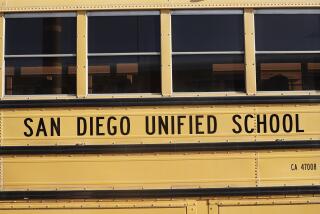Wholesale Food Cost Increases Blamed : School Board Raises Cafeteria Prices
San Diego city schools trustees voted Tuesday to raise school cafeteria prices, to maintain limited fee-for-ride student transportation despite legal questions and to begin an academic enrichment program for 17 schools whose student populations are now heavily nonwhite.
Trustees also approved an innovative summer school program at Torrey Pines Elementary and decided to apply for a $60,000 grant to study whether social service agencies can better coordinate their aid to families with children in area schools.
The cafeteria price increases result from steep jumps--almost 22%--in wholesale food costs stemming both from drought that has reduced supplies and from a drop in the amount of federal surplus commodity foods available.
New charges are: elementary school lunch $1.00, up from 80 cents; elementary school breakfast 50 cents, up from 45 cents; secondary school lunch $1.50, up from $1.25; and secondary school breakfast 50 cents, up from 40 cents. Needy students will still receive free meals under a special federal school lunch program.
Ruling on Bus Service
The board will keep a small parent-subsidized busing program that serves 700 students at seven schools--out of 118,000 total students in the district--who live in canyons or other areas that require a long walk to schools. Parents pay 80 cents per student per ride, about 41% of the total district cost.
A Ventura County Superior Court ruled last year that the California Constitution does not allow school districts to charge such fees. San Diego school district attorney Tina Dyer said Tuesday that it is unclear whether such a ruling applies statewide, although the state Department of Education has ordered all districts to stop charging for any bus service that they offer.
But board members said they are willing to risk legal action against them by keeping their small program, which parents must initiate and provide with a minimum 40 students a day. Trustees said the benefits of having students show up at school every day outweigh possible costs from any court challenge. The district would probably stop the service rather than provide it free because of the almost $250,000 annual cost if it paid all fees.
The board approved academic enrichment academies for 17 schools whose enrollments have changed from predominantly white to predominantly nonwhite since a 1977 court order requiring integration programs in city schools. The plan, which follows amendment of the court order, will be phased in over a nine-year period and give the schools access to state money available for integration-related enrichment programs. The first four schools--Jackson and Hamilton elementaries, Mann Middle School and Montgomery Junior High--will begin planning this fall. More schools will be phased in at a rate of two a year.
Grant Will Be Sought
The district will apply for a $60,000 planning grant from the San Francisco-based Stuart Foundation to study how school administrators can work better with county, city and community college social service agencies in giving aid to low-income parents and students. The nine-month study in the East San Diego area around Hoover High School will determine whether the agencies can set up a “one-stop” location where clients could go for help, administrators said.
There was some confusion over how the grant relates to plans for a health and social service center at Hoover tentatively approved last month by trustees after a bitter debate over whether family planning services would be included.
Administrators said that the one-stop concept for job counseling, child abuse help and other services could be merged with the Hoover plan, now being drawn up in detail, should the proposed study show definite benefits to such an arrangement.
More to Read
Sign up for Essential California
The most important California stories and recommendations in your inbox every morning.
You may occasionally receive promotional content from the Los Angeles Times.










